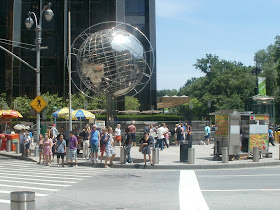Home to the massive Time Warner Building, (which was almost even more massive before-- guess who--Jackie Onassis -- got involved)-- it is also a place for transfer between West Side subway lines.
First , the area and then the history:
Time Warner Center, the world headquarters of the Time Warner corporation, is located on the west side of Columbus Circle on the site of the old New York Coliseum. The complex also hosts the Shops at Columbus Circle, Jazz at Lincoln Center, the New York City studio headquarters of CNN and the Mandarin Oriental, New York hotel. On the north side of Columbus Circle is the Trump International Hotel and Tower, with its noted steel globe. This building had been an office tower, the headquarters of the Gulf+Western conglomerate, which was stripped to its steel skeleton and reclad in a new facade.
On the northeast lies the Merchant's Gate to Central Park, dominated by the USS Maine National Monument designed by Harold Van Buren Magonigle and sculpted by Attilio Piccirilli, who did the colossal group and figures and Charles Keck, who was responsible for the "In Memoriam" plaque.[2] An imposing Beaux-Arts edifice of marble and gilded bronze, it was built in 1913 as a memorial to sailors killed aboard the battleship USS Maine, whose mysterious 1898 explosion in Havana harbor precipitated the Spanish-American War.
The address 2 Columbus Circle is where Actors' Equity was founded in 1914, in the old Pabst Grand Circle Hotel, a building torn down in 1960 in order to construct a distinctive new tower designed by architect Edward Durrell Stone to house the Huntington Hartford Gallery of Modern Art. Vacant since the city's Department of Cultural Affairs departed in 1998, it was listed as one of the World Monuments Fund's "100 most endangered sites". The building's radical transformation by architect Brad Cloepfil into the new home for the Museum of Arts & Design continues to raise hackles[3] for the failure of the city's Landmarks Preservation Commission to hold hearings on its worthiness for designation.
240 Central Park South, the 1941, balconied moderne apartment building across Broadway from the museum, is a city-designated landmark with a new addition atop its retail base, a green roof.
History
Columbus Circle, named for Christopher Columbus, is a traffic circle and heavily-trafficked intersection in the New York City borough of Manhattan, located at the intersection of Eighth Avenue, Broadway, Central Park South (West 59th Street), and Central Park West, at the southwest corner of Central Park. It is the point from which all official distances from New York City are measured. The name is also used for the neighborhood a few blocks around the circle in each direction. To the south of the circle lies Hell's Kitchen, also known as "Clinton", and the Theater District, and to the north is the Upper West Side.
Completed in 1905 and renovated a century later, the circle was designed by William P. Eno – a businessman who pioneered many early innovations in road safety and traffic control – as part of Frederick Law Olmsted's vision for Central Park, which included a "Grand Circle" at the Merchants' Gate, its most important Eighth Avenue entrance.
The monument at the center of Columbus Circle, created by Italian sculptor Gaetano Russo,[1] was erected as part of New York's 1892 commemoration of the 400th anniversary of Columbus' landing in the Americas. Constructed with funds raised by Il Progresso, a New York City-based Italian-language newspaper, the monument consists of a marble statue of Columbus atop a 70-foot (21 m) granite rostral column decorated with bronze reliefs representing Columbus' ships: the Niña, the Pinta, and the Santa María. Its pedestal features an angel holding a globe.
Renovations to the circle completed in 2005 included new water fountains by WET, of Fountains of Bellagio fame; wooden benches; and plantings encircling the monument. The inner circle measures approximately 36,000 square feet (3,300 m2), and the outer circle is approximately 148,000 square feet (13,700 m2). The redesign, by the Olin Partnership of Philadelphia, Pennsylvania, was the recipient of the 2006 American Society of Landscape Architects’ General Design Award Of Honor.



No comments:
Post a Comment
Please leave a comment-- or suggestions, particularly of topics and places you'd like to see covered